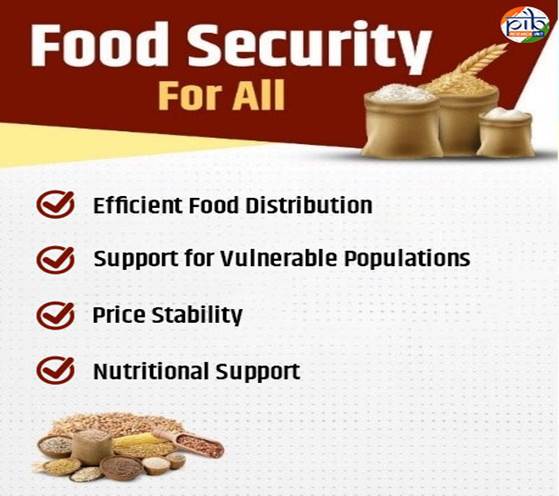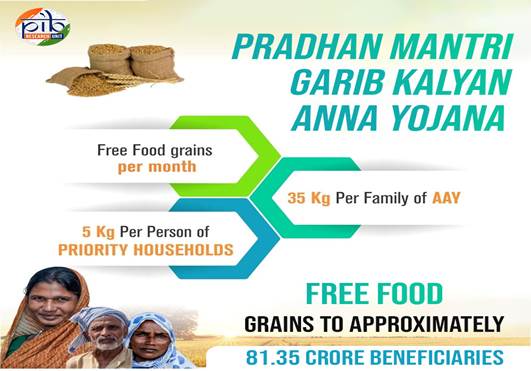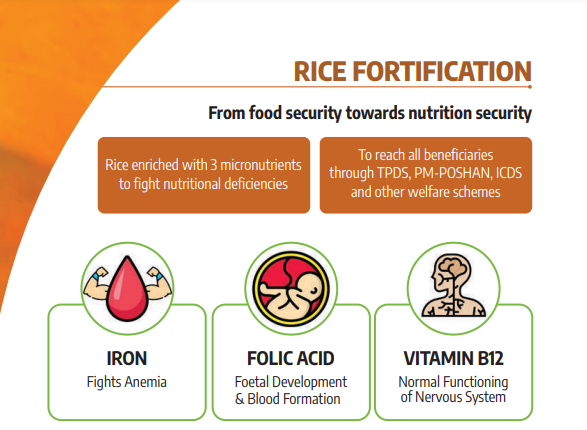Others
Government Initiatives to Ensure Nutrition Equity in India
From Policy to Practice : Implementing Food Security Measures in IndiaTop of FormBottom of Form
Posted On: 28 JUL 2024 4:23PM
India's food security programs encompass a diverse array of initiatives designed to combat hunger and malnutrition across different demographic segments. These initiatives include national schemes and local efforts targeting vulnerable populations such as low-income families, children, and the elderly. As of July 2024, the Central Pool holds 608.75 lakh metric tonnes of foodgrains, significantly surpassing the stocking norm of 411.20 lakh metric tonnes. This surplus guarantees sufficient supplies for the Targeted Public Distribution System (TPDS), various Welfare Schemes (CWS), and other government programs across the country.

Several government schemes in India provide free or subsidized food to different segments of the population. Key among these include:
The National Food Security Act (NFSA)
The National Food Security Act legally entitles up to 75% of the rural population and 50% of the urban population to receive subsidized food grains through the Targeted Public Distribution System. NFSA covers approximately 81 crore beneficiaries across India, including 16 crore women, reflecting its commitment to empowering women. This broad coverage encompasses both Priority Households (PHH) and Antyodaya Anna Yojana (AAY) categories, ensuring subsidized food grains are accessible to a substantial portion of the population.Top of FormBottom of Form
Pradhan Mantri Garib Kalyan Anna Yojana (PMGKAY)
The Pradhan Mantri Garib Kalyan Anna Yojana (PMGKAY) was launched with the specific purpose of ameliorating the hardships faced by the poor and needy due to economic disruptions caused by the COVID-19 pandemic in the country.
The Central Government has decided to extend the Pradhan Mantri Garib Kalyan Anna Yojana (PMGKAY) for an additional five years, starting from January 1, 2024. This initiative will provide free food grains to approximately 81.35 crore beneficiaries.

PM POSHAN (POshan SHAkti Nirman) Scheme
The PM POSHAN Abhiyaan aims to tackle hunger and improve education by enhancing the nutritional status of children in Government and Government-aided schools, and by encouraging regular school attendance among disadvantaged students.
Hon’ble Prime Minister has approved the continuation of the national scheme of PM POSHAN in Schools for the five-year period 2021-22 to 2025-26 with the financial outlay of ₹ 54061.73 crores from the Central Government and ₹ 31733.17 crore from State Governments & UT administrations. Central Government will also bear additional cost of about ₹ 45000 crore on food grains. Therefore, the total scheme budget will amount to ₹ 130794.90 crore.
The Antyodaya Anna Yojana (AAY)
The Antyodaya Anna Yojana (AAY) is an essential social welfare initiative aimed at ensuring food security for the most vulnerable segments of society. Program now supports over 8.92 crore individuals. Notably, among these beneficiaries, more than 2 crore are women, highlighting the program’s focus on addressing the needs of female participants and ensuring their access to critical resources.
This targeted approach not only addresses the nutritional needs of the poorest families but also emphasizes the importance of including women in social welfare schemes, ensuring that their needs are met and they are empowered in the process. The substantial number of female beneficiaries reflects the program's commitment to reaching out to all segments of society and making a positive impact on their lives.
Overview of Rice Fortification in India
Fortified rice is rice that has been enhanced with essential vitamins and minerals to improve its nutritional value. Since the 2019-20 fiscal year through March 31, 2024, approximately 406 lakh metric tonnes of fortified rice have been distributed through the Public Distribution System (PDS).

Government Actions on Price Stability and Affordability
The Government has utilized the Price Stabilization Fund (PSF) to manage price volatility in essential agri-horticultural commodities, ensuring that individuals,especially those from lower-income groups, do not face difficulties due to fluctuating prices.
The onion buffer has increased from 1 LMT in 2020-21 to 7 LMT in 2023-24. This strategic approach aims to stabilize prices and prevent significant fluctuations that could otherwise impact the availability and affordability of these essential items.
Bharat Dal was launched in July 2023, converting Chana stock into subsidized Chana dal priced at Rs.60 per kg for 1 kg packs and Rs.55 per kg for 30 kg packs. Additionally, Bharat Atta and Bharat Rice are available at subsidized rates of Rs.27.50 per kg and Rs.29 per kg, respectively, through NAFED, NCCF, and Kendriya Bhandar.
From Crisis to Confidence: India's Role in Global Food Security
India is a food surplus country today, standing as the largest producer of milk, pulses, and spices, and the second largest producer of food grains, fruits, vegetables, cotton, sugar, tea, and farmed fish. There was a time when India's food security was a global concern, but now, the country is providing solutions for global food and nutrition security. Reflecting on this transformation, India's shift to a global leader in food and nutrition underscores its valuable experience in food system transformation, which is poised to benefit the Global South.
Conclusion
The implementation of food security measures in India is pivotal in addressing the complex challenges of hunger and malnutrition. By focusing on increasing agricultural productivity, refining food distribution systems, and stabilizing prices, India aims to ensure that food is both available and affordable for all its citizens.
Targeted initiatives, such as subsidized food schemes and special programs for vulnerable groups, are crucial in mitigating the effects of economic disparities and ensuring equitable access to essential food resources. Furthermore, integrating nutritional support and adopting sustainable practices not only addresses current food security needs but also lays the groundwork for a resilient and long-term solution.
Reference
****
Santosh Kumar/Sarla Meena/Aparajita Priyadarshini
(Backgrounder ID: 151969)
Visitor Counter : 15092